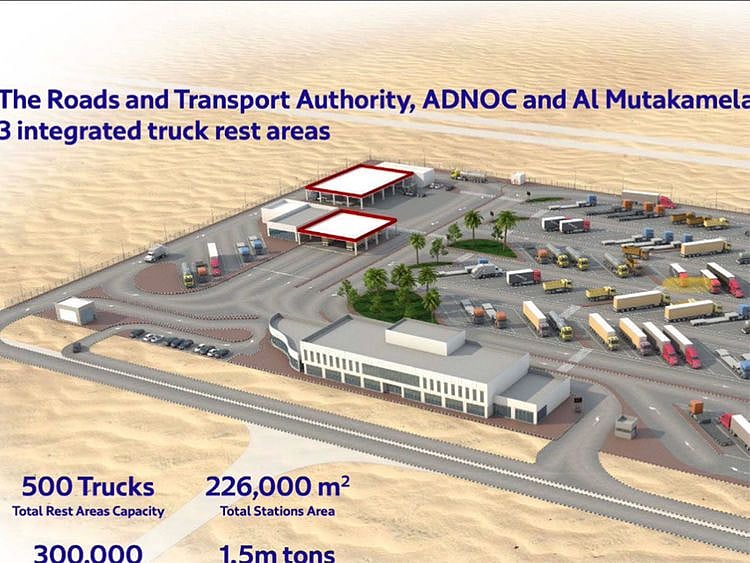Three massive 'Truck Rest Stops' coming up in UAE
Integrated facilities to cover 226,000 sqm, accommodate 500 trucks: RTA

Dubai: The Roads and Transport Authority (RTA) of Dubai has awarded contracts for constructing three all-inclusive Truck Rest Stops in partnership with the private sector.
The first contract was made with Abu Dhabi National Oil Company (ADNOC), and two contracts with Almutakamela Vehicle Testing and Registration. The contracts provide for the construction of three integrated Truck Rest Stops over a total area of more than 226,000 square metres with a capacity to accommodate about 500 trucks and heavy vehicles.
The three stations will provide an array of services to enhance the safety and well-being of drivers. They include residential quarters for drivers, maintenance workshops, restaurants, administrative buildings, prayer rooms, driver training centres, clinics, pharmacies, exchange shops, laundry and other support services for the safety and wellbeing of trucks and heavy vehicle drivers.
Where are the rest stops located?
The three stations are situated in key areas near roads and logistical cities that witness considerable numbers of trucks every day. International standards will be applied to ensure the safe entry and exit of these stations.
The Trucks Rest Stop undertaken by Almutakamela Vehicle Testing and Registration on the Sheikh Mohammed bin Zayed Road is located near Jebel Ali Free Zone and Al Maktoum International Airport. It spans 100,000 square metres and has a capacity of 200 trucks and heavy vehicles. The second station, which is undertaken by ADNOC, is situated near Emirates Road, next to the Al Tayy Racetrack. It has an area of 76,000 square metres and a capacity of 150 vehicles. The third station, which is also undertaken by Almutakamela, is located nearby the entry to the Dubai Industrial City (DIC) and covers 51,000 square metres and has a capacity of approximately 120 trucks and heavy vehicles.
Well-being of drivers
Mattar Al Tayer, Director-General and Chairman of the Board of Executive Directors, RTA, said, “The agreement concluded with ADNOC and Almutakamela to build and operate these three rest-stops, aims to enhance the safety and wellbeing of drivers by providing amenities and services they need in daily life. The total area of the three stations is about 226 thousand square metres, and their capacity ranges between 120 to 200 trucks and heavy vehicles each.
“The construction of these Trucks Rest Stops contributes to solving issues of parking trucks on main roads and residential areas and meets the rising demand for trucks parking spaces. This is particularly crucial as trucks in Dubai make more than 300 thousand trips, transporting approximately 1.5 million tons of goods per day. The stations will also contribute to raising the traffic safety level, reducing traffic incidents caused by trucks, and streamlining the traffic movement during the truck ban times,” he said.
“The project generates an additional revenue stream for RTA and offers investors opportunities to engage in the development of different projects. The project also contributes to improving the quality of public services, transferring knowledge from the private sector to the public sector, and training civil service employees on managing and overseeing this type of long-term projects based on the Build-Operate-Transfer model.
“The selection of the appropriate sites for constructing these rest-stops is based on a set of technical criteria and studies to maximise the benefits of these facilities and serve the land transport business. The choice of locations was geared by the proximity to main roads, strategic areas and logistical cities to provide daily service to the largest possible number of trucks,” he added.
Field surveys
“RTA assigns top priority to land transport due to its importance to economic development. RTA carried out a comprehensive study of trucks movement in Dubai. It included field surveys, interviews and workshops with the concerned departments and companies. It developed a predictive model of trucks movement and assessed the need for dry ports and cargo collection and distribution centres. The studies conducted also assessed the policies, times and routes of the current trucks movement ban, and the need for designated truck roads in addition to organisational and structural aspects related to the management of trucks and goods movement in the emirate.
Sign up for the Daily Briefing
Get the latest news and updates straight to your inbox
Network Links
GN StoreDownload our app
© Al Nisr Publishing LLC 2026. All rights reserved.